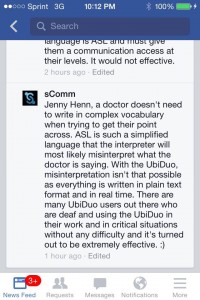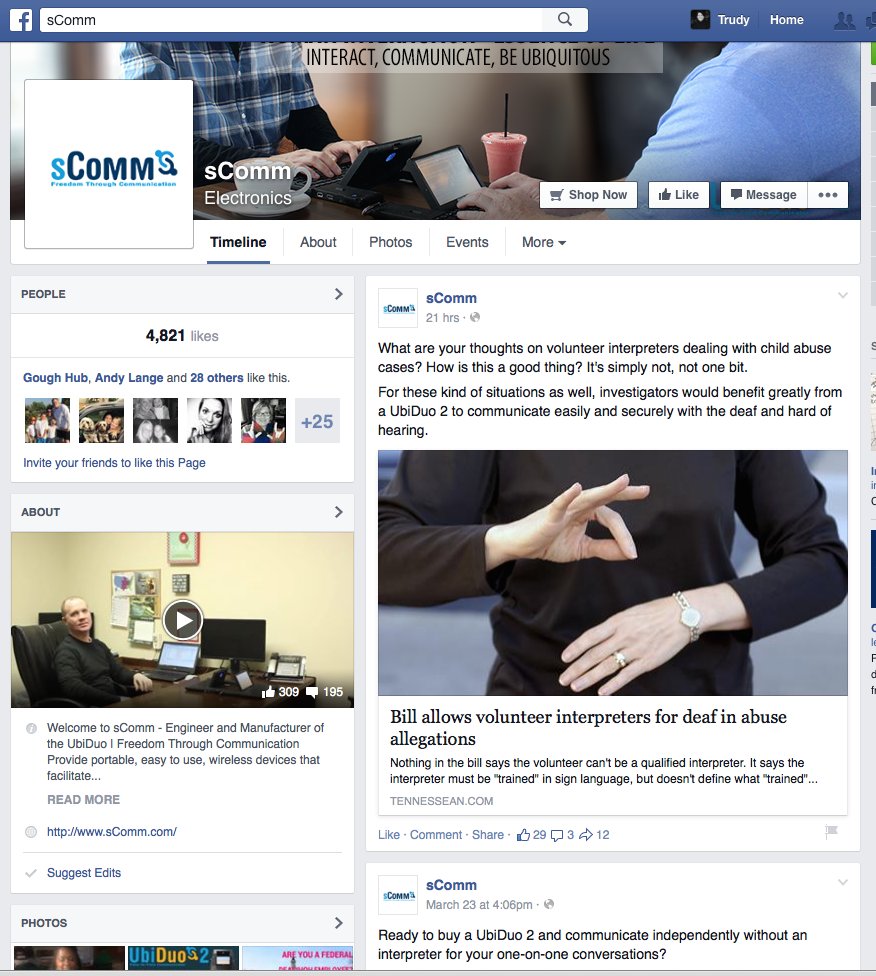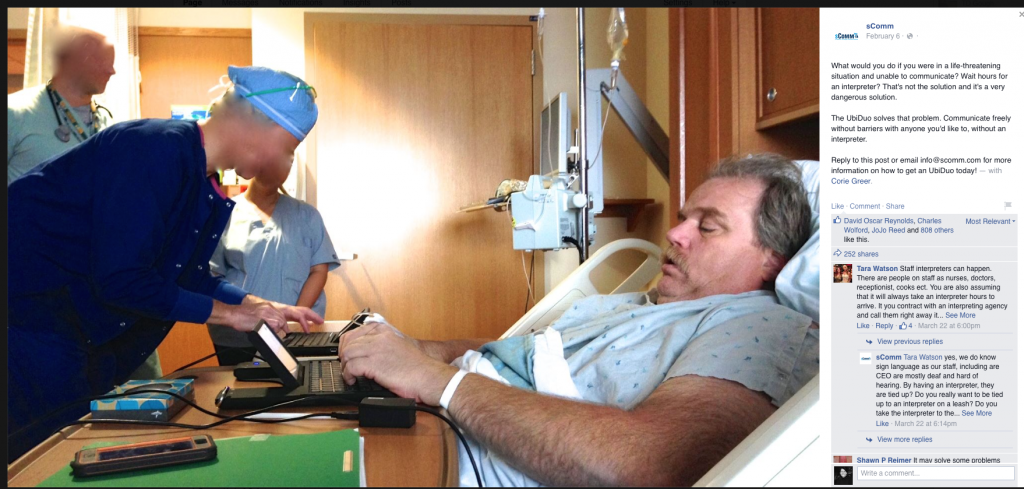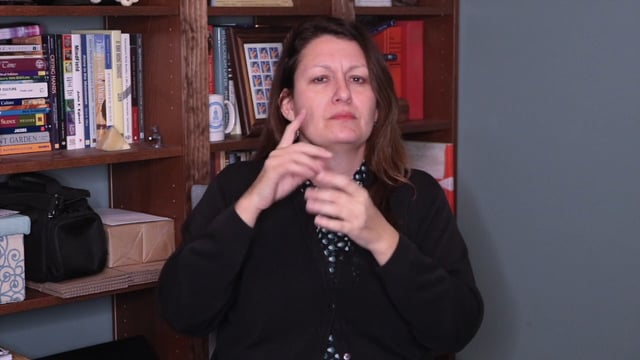(See the bottom of this page for a link to sComm’s response to this and my follow-up response in both ASL and English. I have also posted updates at the end of this page.)
A friend texted and told me to look at the sComm Facebook page; sComm is the company that markets the UbiDuo device. Saying it enables “the Deaf, Hard of Hearing, and Hearing [sic] to Communicate without Barriers,” it touts the UbiDuo as “the world’s foremost communication solution for people who are deaf, hard of hearing or hearing.” It also states almost proudly, it seems, that there “is no need for an interpreter with the UbiDuo.”
When the UbiDuo, produced by sComm, first came out, I was a bit skeptical because the device didn’t seem like anything special; it was like a makeshift set-up of two TTYs connected to each other. Even though some people I knew worked for sComm, I still wasn’t convinced of its value.
Based in Raytown, Mo., the company was founded by Jason Curry, who is deaf, and his hearing father David. The sComm website says, “The UbiDuo was born out of pure frustration.” The story is that the father and son duo “sat down for breakfast one morning and struggled to carry on an in-depth business conversation, free of misinterpretation and confusion.” David sketched his vision of a product, and, “Just like that, one family’s efforts to achieve meaningful and treasured personal connections through communication brought the same life-changing triumph to millions of other deaf and hard of hearing individuals across the world.”
People have the option of getting the UbiDuo 2 Wireless for $1,995 or the UbiDuo Wired for $2,195. Oh, and if you want enhanced security, that’s another $150, and then the carrying bag for the UbiDuo is yet another $50. The sComm website lists along its clients Walmart, Wells Fargo, the White House, Coca-Cola, the Canadian Hearing Society, Goodwill, Pride Toronto, Wegman’s, the U.S. Postal Service, NASA, several universities, and even the U.S. Army and Pentagon.
Within the past few years, sComm has begun aggressively marketing the UbiDuo as a way to replace interpreters rather than as a communication tool. When I lived in Minnesota, a local advocate who worked for sComm allegedly convinced the local hospital — which had been super in providing immediate access to interpreters — to use the UbiDuo for emergency room communications instead of interpreters. Knowing this advocate’s belief system, I didn’t buy that he would actually push for this.
When my husband had to go to the emergency room, we found the rumor was true. My husband texted me, confused, saying that the nurse told him no interpreters were available because it was the weekend. I knew this was not accurate information, and since I had worked closely with the hospital for years in ensuring top-notch interpreter provision, I immediately told him to take photographs or get a copy of the nurse’s notes. The nurse also said the UbiDuo was now the standard for emergency room visits instead of interpreters. When I notified my contacts at the hospital, they apologized and said they would immediately remedy this mistake by communicating with the ER staff.
So after my friend’s text, I looked at the sComm Facebook page and couldn’t believe my eyes. In a post that has since been removed, sComm shared the article regarding Tennessee’s proposed law to use volunteer interpreters, and said: “What are your thoughts on volunteer interpreters dealing with child abuse cases? How is this a good thing? It’s simply not, not one bit.” I thought, “All right, that’s a great start.” But then the next paragraph floored me.
sComm wrote, “For these kind of situations as well, investigators would benefit greatly from a UbiDuo 2 to communicate easily and securely with the deaf and hard of hearing.”
I shared that post on my Facebook page, and added, “Uh, no! A UbiDuo 2 does NOT help if one is physically injured, traumatized, or scared. It also does not help if one is too upset to think straight in English, or is not fluent in English. I know when I’m really upset, I don’t want to have to type my thoughts out, even if temporarily. There have been times where I was too shaky to even hold a pen, much less type.”
I went back to the sComm page and asked, “Are you seriously proposing the UbiDuo 2 as a replacement (even if temporarily) for an interpreter based on this proposed law?” The response was a brief, “Yes, we are.”
Lest anyone think otherwise, this was not the first time sComm had made such outrageous comments. In a Feb. 6 post, sComm posted this:
“What would you do if you were in a life-threatening situation and unable to communicate? Wait hours for an interpreter? That’s not the solution and it’s a very dangerous solution.
The UbiDuo solves that problem. Communicate freely without barriers with anyone you’d like to, without an interpreter.”
Again, no. In order to use the UbiDuo, one needs to be fluent in English, and of a sound mind and not in any emotional distress. In cases of abuse, especially with children, this is usually not the case. When I saw the response, “Yes, we are,” I immediately thought of my four deaf children who are aged 7 to 3. Although the older two are developing fluency in English, they’re not quite there—and even if they were, I would not want them to have to type on a machine, especially if they’re injured or traumatized. They should, instead, be given a qualified, certified interpreter (and even a Certified Deaf Interpreter), so that they have full access to everything around them and have full access to expressing themselves in their native language.
Unfortunately, sComm has a history of pushing for the UbiDuo to replace interpreters. Just look at the blurb on the American Bar Association’s website:
The UbiDuo enables deaf/hard of hearing people to communicate with hearing people without any face to face barriers. The UbiDuo is a two-screen, two-keyboard electronic communication device. It is completely portable, wireless, operates in real-time, and is completely stand alone. This device was tested in the 13th Circuit and was very successful. OSCA then purchased 38 units through the Basic, Data and Training Grants for distribution statewide. Having this equipment significantly reduces the need for hiring deaf interpreters. These devices are used in courtrooms and juvenile offices for child welfare hearings, meetings, visitations, trainings, and other related events.
And then there’s the lawsuit brought against a Jacksonville, Fla., hospital:
Caserta said an UbiDuo communication device used at Baptist that allows patients and staff to communicate with keyboards and monitors isn’t helpful if the patient struggles to read, write or type, as several of her clients do.
sComm has also posted comments repeatedly saying they want to replace interpreters with UbiDuos. For example, take a look at this screenshot shared by Jahan Farzam-Behboodi:
Derek Braun, Ph.D., a biology professor and the director of a molecular genetics laboratory, said in a response to my post: “I had a situation last year where I was in the hospital and in bad shape after a surgery that did not go well, and I couldn’t breathe. My head was swollen up. The doctors were trying to figure out if [I] had a pulmonary embolism.” He explains that the hospital brought in a TV for video remote interpreting. “Of course I couldn’t even see the TV because I was in bed and couldn’t sit up (or breathe!). My wife told me later that the connection was crappy anyway. She yelled for a real interpreter. That was almost criminal. What sComm is proposing is worse, and yet another step down the path to depraved indifference.”
Diane Plassey Gutierrez also wrote on my thread, “This is frightening. I recently had heart surgery and was unable to communicate with the medical staff for three days afterwards, due to fuzzy vision and weakness in my arms so that I couldn’t hold a pen. Fortunately the hospital brought in an interpreter and was able to communicate my immediate needs to the staff. I know I would be scared to go to a hospital or clinic that relied mainly on the UbiDuo with its frequent breakdowns, inadequate staff training in its use, and misunderstandings since not every Deaf person and not every medical staff person is fluent in written English.”
After seeing my Facebook post, several people posted comments on the sComm Facebook page, and sComm deleted most of them. I also asked at the sComm page if anyone on the sComm staff had deaf children, since I had four deaf children and knew firsthand the dangers of their mission to replace interpreters. They did not respond.
Given the grave, potentially life-threatening, misleading message sComm is promoting through social media and probably in its business-to-business marketing efforts, it is crucial that CEO Jason Curry step up to the plate and recognize that they need to develop a new marketing strategy that focuses on the truth, rather than hyping a one-size-fits-all solution that puts full, appropriate communication access at risk. sComm must also publicly recognize that the UbiDuo cannot be offered as a replacement, but as an option. Their current stance is dangerous, and puts entities using the UbiDuo in place of interpreters at great risk for misunderstandings, miscommunication and liability.
sComm may also rethink its statement on its website: “sComm is relentless in its efforts to transform face-to-face communication for deaf, hard of hearing, and hearing people and will not rest until it has achieved 100% one-on-one communication equality.” Certainly. sComm has been relentless in refusing to recognize that what they promote is not communication equality. And I will be relentless, too, about that.
UPDATE: sComm released a video responding to the criticism about its post. I share my thoughts on the sComm statement in this video response. The transcript is below.
Hi. When my article was released, I was taken aback by the thousands, actually, almost 20,000 views of the article, which was in relation to sComm and the UbiDuo. Of course, the majority expressed anger and dismay. Just a few hours ago tonight, March 27, sComm posted a video with Jason Curry, the head of sComm; sComm produces the UbiDuo. He said, in sign language, that sComm does not support the replacement of interpreters with UbiDuo; rather, the UbiDuo is ideal for when interpreters are not available. That was the essence of his message. I watched his video, and…I applaud him for responding to the criticism. Still, what he did was spin-doctoring, trying to control the information so that the real issue is pushed aside. I’d like to emphasize this, though. Some people seem to think the UbiDuo is fine. Yes, it’s perfectly fine — if you can use it effortlessly and are satisfied with it. If you don’t need an interpreter, then by all means, use it. But for situations involving hospitals, trauma, police, court, and specifically children — I have four deaf children aged 7 to 3. The older two probably could use it — but in cases of trauma, that’d be a very bad idea. I’d prefer to see an interpreter and even a certified deaf interpreter brought in so that the children can know everything that’s going on around the. Not just the conversation on screen, but also what’s being said around them that the interpreters could interpret. Not just for my children, but even for myself. Even if I’m fluent in English, when I’m upset, I prefer to sign, or when if I’m shocked. In crises, no, the UbiDuo isn’t a good idea. Besides, I don’t want anyone to tell me that I can’t have an interpreter, that I must use the UbiDuo. I get to decide, not them. That’s the essence of my stance.
At a recent workshop I presented, a participant shared the example of another person whose first language wasn’t English. This person went through a court report and marked off areas that were not true, but she wrote “not sure” [the signs for both words are similar]. She thought the word for “true” was “sure.” Obviously she didn’t have fluency in English, so for people like that, it’s not fair to force them to use the UbiDuo. They might think they can write in English, but they’re not in reality fluent. That’s risky. So my point is that I appreciate Jason’s comments, but no, sComm needs to go back and revise all of their messages, all of their website contents, print materials, everything. Even their meetings with everyone — sComm has numerous high-profile clients — governmental agencies, and everyone. They need to go back and inform everyone that the UbiDuo is an option, not a replacement. If they don’t do that, then they’re really endangering a lot of people’s lives. They say they’re relentless; so am I. I will keep on until they improve their message. I don’t want them to put me or my family at risk, period.
March 28: This story just gets more mind-boggling. Someone shared this link with me, produced by sComm. At about 2:50, this appears:
“Crippled”? Really? And the video also, even if jokingly, promotes VRS fraud. To stay updated, be sure to visit my Facebook page.
March 29: I posted this on my Facebook page tonight.
Hi, everyone! A huge thank you to everyone who has shared their input, and to everyone who has provided screenshots and videos posted by sComm.
Here’s what has happened since I first posted my article/video showing how sComm claimed that the UbiDuo should replace interpreters, particularly in child abuse cases. This article has been seen by tens of thousands of people.
sComm did release a video clarifying that they did not support having only UbiDuos in child abuse cases (and I posted that on my website); I posted a follow-up video to that on Friday, March 27. Since then:
1. sComm has deleted all of my comments (unfortunately for them, I kept screenshots and copies of their videos). They have also deleted many of their dissenters’ comments. Otherwise, they’ve been staying quiet aside from having their supporters respond to dissenters.
2. More and more people have sent in emails and information demonstrating just how deep sComm’s mockery and oppression of ASL and interpreters has gone for quite some time now. It’s heart-breaking, truly, especially as a deaf business owner myself. I actually have no problem with the device itself; it’s the ethics (or lack of, rather) behind sComm’s marketing and claims demeaning ASL and mocking interpreters that I cannot support.
4. I am releasing a letter to sComm asking for a few things; that will be posted here and on my website tomorrow.
5. In the meantime, I ask that we all not mock anyone’s signing or communication preferences. When anyone does this, this is no than sComm demeaning ASL.
If you think what I have posted isn’t enough, here are additional screenshots — from February 2015 — of where sComm states that ASL is a simplified language.


This article can not be copied, reproduced, or redistributed without the written consent of the author.










I think a lot of things were taken out of context or misinterpreted. I did not see anything that suggested Ubi-Duo be used in lieu of a real live interpreter for every situation. He is marketing it as a device that does not require interpreter, ergo, privacy.
Someone responded for Jason and you only used the brief response that Jason provided in that comment section up there which you shared. What the person said, responding for Jason pretty much clarifies that it is not used in every situation.
I have not seen anything at all that points to a mandate. Since there is no mandate, don’t you think this is being blown out of proportion?
You also should have talked to Jason directly, asked him if he would be able to VP with you to clarify on some of the things that was said on sComm wall.
No mandate. None at all.
Not everyone requires the same kind of equal communication access and Ubi-Duo is not for everyone just like CART isn’t for everyone, likewise ASL interpreter isn’t for everyone. This needs to be understood and accepted by every entity such as hospitals, courts and so on.
That ok, deaf and mute people, majority, rather use ASL interpreters (two accommodations of 1) speaking to sign for hearing-impaired rights, and 2) signing to speak for speech-impaired rights). We, deaf and mute people should speak for deaf people but show support for the group as they entitled to say what qualified for them to access to services and so on. Deaf people are group of people with one disability and majority are English users as depending on CC, hearing aids, CI, SEE or TTY or so as long they are under English community. For ASL users, they should focus on language rights not disabilities rights.
correction on my comment: “We, deaf and mute people, shouldn’t….”
sComm had been repeatedly pushing me and another deaf employee to have our employer buy UbiDuo. We refused again and again. We prefer to have interpreters on hand at work because this way the interpreter can voice our feelings, thoughts, and emotions. Furthermore, the prices are outrageous. One day I was at sComm for an event. Jason was sitting on a couch, pointing at me, signing “You stubborn. You refuse to buy.” I smiled and shrugged my shoulders. Now reading the above, I am SO glad my employer doesn’t have one at all!!
sComm, if you are reading this, you are WRONG! Nothing, I mean, nothing, not even robots, can replace interpreters! Never! You are getting the companies, especially the hospitals, involved with the lawsuits. I won’t be surprised when, not if, you will be hit with one or more in the very near future. I wish you lots of luck.
sComm is also disregarding the guidelines of ada. “For more complicated and interactive communications, such as a patient’s discussion of symptoms with medical personnel, a physician’s presentation of diagnosis and treatment options to patients or family members, or a group therapy session, it may be necessary to provide a qualified sign language interpreter or other interpreter. http://www.ada.gov/hospcombrprt.pdf
I’m floored…. Flabbergasted… FURIOUS!
Have you thought about going to the UbiDuo’s home state Better Business Bureau (BBB) website- and if they are listed- write a negative review? That’ll pull them down a notch or two. It becomes public record…
I’m not one for politicking but I will not stand for this – neither as a Deaf consumer nor as a CDI. This is horrifying!
M
Thank you for bringing our attention to your factual article. I find sComm product horrifying, I just had two procedures that required communication and fully awake. The specialist and his assistants wanted to know if I was in pain when the procedure was administered. The Ubi-Duo product that James and his father is unlikely to work out for me because I was required to stay still with my body facing down. I used my arms up and face on side to recept and express with the facilitation of our Auslan interpreter, hence the product does not meet our need. If we were required to have the sComm product then my procedure could be a life-threatening and paralysed. And also, I prefer to feel without distressing, if I have to communicate, is using my natural visual language. My Auslan, ASL or other country’s natural sign language is full acquired with 100 percent access and comfortable zone. Why do we have to remind our majority our history do repeat with barriers, they have not listened to us, still?
Elizabeth,
sComm is not disregarding the ADA guidelines but rather it is the hospital, medical centers and doctor offices, the people who run them. They are the ones who do not follow ADA guidelines if their patients require and prefer sign language to communicate in such a situation you have described in your quotes. They are the ones who directly deal with deaf patients, not sComm.
What is disturbing about SComm is that they act like they care about child abuse cases by opposing the use of volunteer interpreters then, all of a sudden, they try to sell their product for monetary gains. What’s so distributing is that they suggest that their product is ideal for high-risk situations involving Deaf people whose native language is ASL. How is it ideal if their product makes Deaf people to use their SECOND language to communicate in high-risk situations? Would YOU feel comfortable communicating in a language that is not your native language? What SComm is doing is disrespectful to native ASL speakers and ASL itself. We have been working tirelessly, for years and years, to gain our right to ASL interpreters and raise awareness of
the importance of providing ASL interpreters in all situations. it’s as if SComm jumps in front of us, pushes us back, and tells the public that their product is more effective than our preferred accommodation. It’s just wrong.
From the moment I first saw this company at the beginning of February, they have attacked the use of interpreters, used scare tactics, and insisted the only use their device and not signing to communicate in office rather than face to face. When I questioned them, they said signing was too slow and deaf people are fluent in English and type faster than signing. The arrogance!
scomm’s left multiple claims about scomm replacing interpreters such as ”doctors need to eliminate the interpreters and start using ubiduo’ and its claims of ‘ubiduo being fully accessible’ leaves no doubt its intentions. it’s educating the hospitals and the medical centers with false statements. you may deny all you want, but ample evidence are on the internet.
due to your vested interest in scomms, you may want to consider advising scomm to consult an attorney about its legal liabilities for spreading misinformation which may result in severe violations of deaf people’s civil rights and any injuries due to breakdowns of communication from using improper communication devices. have a good day, mike
Reminds me of the time I was in ER when the ER doctor asked the nurse to ask me in writing if I could lip read lips and I finger spelled back with “can you read what I am finger spelling?” He shouted at the nurse to get an interpreter in here.
Elizabeth,
In my opinion and observation I see it as a fully accessible communication device to those who *choose* to use it to communicate and are able to use it with a hearing person. There are culturally deaf people who use it, and deaf non-signers who use it. They have used it in a hospital or medical center and dentist settings, for example. Secondly, as it has been clarified before, deaf/hh people have the right to choose which mode of communication that will meet their communication needs. Lastly, the product is an ADA compliant product and is certified as such. In my mind there is no “spreading of misinformation” when it does, in fact, provide 100% communication access to those who can use it. It has shown to be so many times over. Again, if a deaf person feels he or she is not being properly accommodated when it comes to his or her communication needs at a place of service then it is the place of service that should be looked at, and not the UbiDuo product. The same can be said for a deaf non-signer suing a place of service for not having proper communication accommodation when the use of a VRI or ASL interpreter would be completely useless. It’d be the same kind of stupid service offered that makes no sense like giving a deaf sighted person a Braille menu at a restaurant.
Your use of the term “vested interest” towards me is entirely misplaced and with the wrong assumption. There is no financial gain on my part. The product in question has shown to be wholly beneficial on helping bridge the communication gap between many deaf and hearing people. That has been documented so many times. As for yourself? No standing at all whatsoever.
Scomm’s core marketing message is not aimed at patients or medical personnel. It’s carefully pitched to the beancounters, the people who oversee the balance of costs and expenses. Scomm is offering them a way to cut costs with plausible deniability for legal purposes.
Just say no. It may be necessary to suggest that the good interpreter standards and contracts with quality agencies are a far greater shield against lawsuits than an overpriced device that can expose firms to more frequent communication breakdowns.
we have already seen a screenshot showing scomm urging doctors to ‘replace interpreters with ubiduo’. there are many other examples. you are trying very hard to do damage control, but it’s already too late. not only are there many facebook people covering this, but i’m also using twitter to show the screenshots of scomm’s statements. the public can decide for themselves. have a nice evening, mike
Gina,
I am constantly seeing your name all over elaborating that sComm didnt do anything wrong, or that we took it out of the context. First of all, the photo above obviously shows that replacing the ubiduo to interpreters is in his agenda. Secondly, when a community reacts collectively, it is an OBVIOUS there is a concern for it. You need to LISTEN to the community, unless you are on sComm’s payroll. Thirdly, you need to stop this. The obvious is here, and please walk away from this. It has angered us collectively. You cannot deny or turn a blind eye to this whole situation.
Trudy, I really appreciate all you have been doing to shed light on what is happening. As a freelance medical interpreter in the same metro area as their headquarters, I have had to deal with hospitals trying to force this on Deaf patients. Fortunately, most of the hospitals here have heard from the Deaf community , and the majority of them are collecting dust in a closet. But then again, according to Jason, I am just a dog.
Last year, my dad had to go to the University of Vermont Medical Center
in Burlington, VT in order to have his gall stone removed from his bile duct.
My family and I have requested an RID certified interpreter to assist us with
the procedures. The hospital tried calling a few, but most of them were unavailable.
However, they tried using the VRI and it worked great for us (as a ttemporary
solution.) The doctors, my dad, my family, the VRI interpreters and I were
able to communicate effectively with spoken English and ASL via VRI. My
dad is now doing well since the doctors were able to get the gall stone out.
Since then, the hospital have hired an RID certified staff interpreter that will
meet their needs as well as Deaf patients. That staff interpreter is also
responsible to get other RID certified interpreters (if available) to meet
the doctors and Deaf patient’s needs. That hospital have never used UbiDuo
at all. They prefer using RID certified interpreters (if available) or VRI.
Thank you for shedding light on the controversy regarding UbiDuo, VRI, RID certified
interpreters and the Deaf community.
i want to thank trudy suggs for taking the time to alert the deaf community what scomm had been doing. her post is now 8th on the google which is pretty good for a three days old post. people searching for problems with ubiduo will find trudy’s post quickly.
My experience is the same as Peggy Virnig Mnich— at an event, Jason did not understand my communication needs. He said that my agency wasted so much money on interpreters and that I should write well. UbiDuo isn’t an effective communication for me. I am Deaf and have limited English proficiency, my life will be in danger if doctors communicate with me through UbiDuo.
That is the BIGGEST issue in the deaf community!
All technology always has pro and con BUT in deaf culture is very sensitive to technology in some how.
I believe that Jason did changed his message to ” protect himself or his libity. ” I remember I watched SComm video, one nurse did made a comment in SComm website last year, maybe 2 years ago, saying ” Callaway County Hospital ( Fulton , MO ) used UbiDuo to save money from not use an interpret. Many deaf and patients were very upset and puzzled. I just learned that that hospital has been used UbiDuo since 2008. I was shocked. It has been long battle and complaining. I real am not real favor to have UbiDuo in hospitals as well as in all courts. UbiDuo is good idea for hearing family, business and shopping. For big example : when a client or person in real serious injury or real sick, it is NO way to communicate via UbiDuo,when he or she has serveal tubes in his or her hands or arms, they CAN’T type because of tubes in their ways. What is more when a patient in X-Ray room or MRI room, they can’t use UbiDuo there, Other all patients laying on bed flat, NO way to type UbiDuo when patients laying flat with their heads down. Come on ! I remember my wife had her back surgery, it was possible to use UbiDuo, toooooo painful to type or write, thankful had an interpreter there. Now I know Jason will be in HOT water real soon. Why did he just recently post his updated video in his FaceBook? Go Figure !
Now it is time to call or email to NAD,deaf services and deaf clubs. We need your help !
Timothy, are you serious? Is that the best you can do, accusing me of being on the payroll. Wow, like people who show up and support something, they have to be paid or something? Pffft.
I have always known that Jason accepts and supports all languages and all forms of communication, unlike you.
As deaf consumer it is the job of deaf/hoh to be assertive in demanding equal communication access that FITS them the best. Clearly Ubi-Duo isn’t for everyone. I saw one comment where a deaf person told a hospital staff that he/she cannot use Ubi-Duo and requested a live interpreter and the hospital complied. They have to because the law says so. An interpreter, CART, VRI, Ubi-Duo, etc all of these different types of communication access does not always work for every deaf/hoh people. It is the job of the consumer to educate the public.
If any entity forced anyone to use one specific kine of communication access against the wishes of the deaf consumer, then file a Department of Justice ADA complaint. The ‘onus’ at that point is the entity that denied that deaf person his/her communication access. No one else but that entity and let the courts sort it out.
There are only 2% of deaf/hoh in USA who uses ASL. Respect other communication access even if it doesn’t FIT yours.
To Gina who posted on March 30, 2015 at 9:44 A.M.–“there are only 2% of deafhoh in USA who uses ASL” Do you have statistics for that? I’m quite certain I don’t agree with this.
Lastly, the device seems to fall under the category of “snake oil salesmanship” at best. It may work only for something informal and for least amount of time (such as up to 15 minutes). It’s not ideal for medical, legal, and judicial settings. Many comments here echo my sentiments.
if an entity forces a deaf/hoh person to use only one particular device based on the fraudulent claims of the company, yes, it can be legally accountable for its actions with dept of justice. the company also can sue the manufacturer for its fraudulent statements, misleading the company to think it’s fully accessible when it isn’t. the deaf/hoh people whose civil rights are violated also has this legal option to file a lawsuit against the manufacturer for defrauding its clients and leading them to violate the civil rights of deaf/hoh people.
Ripped from Gina’s Comment: “It is the job of the consumer to educate the public…”
Are the consumers, and the community in general for that matter, educating the public?
The Deaf and Hard-of-Hearing have been given a ‘bad rap’ for centuries. Only from the media spot light, ADA, and supporters, has the Deaf Community been acknowledged and given equal rights. (Finally!)
I’m disheartened that a company would suggest a machine would replace an Interpreter. The machine could not carry the information, convey an emotion, or come across that same way as if a person had someone who could understand the message. It’s like me telling my phone to convey, my feelings for my partner, in a text. The words are there, but there is no emotions, no way to express my response. My partner would understand the message differently, if I were saying those same words face to face? He could pick up on my facial ques, my body movement, my eye gaze, to get the context of what I’m saying. Yet, in a text… All you see are the words. There are no context clues to help a person figure out what context those words were being written. What happens if English is not that person’s primary language? Do the “professionals” understand the grammatical changes from English to ASL/CASE/PSE/SEE/Etc and vice versa?
Please don’t misconstrue that I’m down playing ASL in the least. I know some people use ASL, CASE, SEE 1, SEE 2, PSE, CME, etc; as their primary language. There are several interpreters that can flow between several signed languages with ease. I also understand about the world-wide shortage of interpreters. With that being said, respect is in short supply, just like access to quality interpreters.
Maybe if more schools, colleges, and universities would accept interpreting as a viable career path, and the signed languages there in, the Deaf Community would be that much more successful…..
Oh and respect, much like trust, must be earned.
Ira:
To Gina who posted on March 30, 2015 at 9:44 A.M.–”there are only 2% of deafhoh in USA who uses ASL” Do you have statistics for that? I’m quite certain I don’t agree with this.
That number sounds right to me. Ten percent of the population would have difficulty with hearing even in just one ear. That includes Ronald Reagan and many others. I would imagine 98% of them do not know sign language because their loss is not severe enough.
Gina’s statement, “… 2% of deafhoh in USA who uses ASL… ” sounds about right. I know so many people with hearing loss in one ear but not the other. They don’t sign either because they never had to. I’d also like to point out the very same people wouldn’t be using UbiDuo either.
Abused Deaf Children Need Certified Interpreters
http://www.deafcounseling.com/abused-deaf-children-need-certified-interpreters/
Thanks Richie for validating that 2%. I’d be happy to go into detail, but all the numbers you need in order to reach 2% is over at the GU website on how many deaf people there are in USA. The low % would be less than 2%, I’m using the higher result. GU has the numbers of how many deaf/hoh there are in USA and they have the numbers of estimated deaf in USA who uses ASL, the numbers are anywhere from a low to a high, the high is about a million. Not so hard to figure out the %. And, if you were to eliminate the old folks and the late deafened, the % would still be small. People don’t realize that deafness is a very low incident disability and signing folks are VERY small. So, small. How often do we see deaf people sign, it’s a small world! ;) Sure is.
years ago my agency bought a number of UbiDuos and I was really disgusted because of the high cost. It was used in the various central and regional offices at our reception areas when deaf and hard of hearing consumers would come for appointments or stop by to see if their counselor were in. Now they are not used any more but it still infuriates me to think of the number of devices and how many were purchased and now they all gather dust. What a waste of taxpayers’ money.
I find it interesting that they refer to instant messaging as a “crippled way to communicate” when their system is just a glorified instant messenger that happens to have both users in the same room. (So…teenagers today, pretty much)
And then saying that using an interpreter is a “crippled” method is strange. How is having someone who can communicate to the deaf person in their natural language crippled?!
sComm needs a serious reality check.
Gail Nygren Wow. I agree it should be the Deaf person’s decision, always! Once installed, the problem becomes that the hearing people push a dysfunctional communication system on deaf patients, employees, etc. who may be afraid to demand what they prefer for communication access and we know that even when demanded, Deaf folks are told “No.” repeatedly. Trudy, as you have shown us, they are making FALSE statements about the benefits of qualified and certified interpreters, and MISREPRESENTING and LYING about the legitimacy of American Sign Language. May I suggest you get NAD and RID to take a look at the information you gathered and their website claims and have their lawyers address the inaccuracies proclaimed by sComm. Trudy, our trailblazer. Thank you
Iit is a amazing to me that, people see what they want to see. For example, the person that does not see that sComm is trying to manipulate those who might need to hire interpreters. They appeal to their frugal if not cheap sides, financially. sComm also, promotes the antiquated falicy that ASL is nothing more than dumbed-down English. Because many people, particularly outside the deaf and interpreter communities are ignorant to the fact that ASL is a true language only lacking written form, they are being manipulated into believing that using their device(s) is an adequate if not superior to communicating in a person’s first language of ASL. Yes, one can type in clear English, in full sentences on the UbiDuo. And, of course there are those deaf and hard of hearing individuals who are fluent in English or even claim English as their first language. But, would that be sufficient for individuals who are “only” proficient in the use of Spanish, Geman or any other spoken language? Of course not! Neither is it sufficient for those whose first language is American Sign Language. As a hearing person and an interpreter, if I were in a situation that required essential, urgent or emergent communication, I would want and dare I say, need, to use English so that communication could happen with as much as ease as possible. The ways in which sComm responded were not only demeaning, but condescending as though ASL is not even a language in its own right. The powers that be should go back in history to see that ASL was was already recognized as a language, via research by Stokoe in the 1960s-70s.
In the name of the “almighty dollar” it appears that sComm is complicit in the oppression of ASL and subsequently its users.
There are many uses for sComm’s device as well as others but, not as a replacement for those who use and need American Sign Language and interpreters. Because ASL is a language, deaf and hard of hearing individuals should be, must be, afforded the same services as those using other languages, when necessary. An UbiDuo would never be used in lieu of a Spanish or an Arabic interpreter. It should not be used or forced on those who need an ASL interpreter.
Yes it is amazing. There are so many sides to this story, not all of them are out, unfortunately. But, hopefullly we will get to see it all out in the open soon…… I think the deaf community has a valid concern, yes, but I also think that once more information is out, it will reveal the truth.
If there are actual situations where people were denied a live interpreter and forced to only use a device like UbiDuo, then, yes…it is a concern. I only saw one person mentioned being offered UbiDuo and person requested terp and terp was given. This is good. But, I have not seen actual stories where a terp was denied because of UbiDuo (if it is out there, I must hae missed it). This is a concern but, I believe that it is not the policy of sComm, based on what I know.
So, let’s hope the full truth comes out soon and a resolution, if any, is implemented.
Also, one more thing I want to add is that Jason Curry is a deaf person who uses different modes of communication, but still deaf like you and I, nevertheless. He uses ASL terp when needed. Deaf vs deaf really has to stop, we need to find solutions and work together.